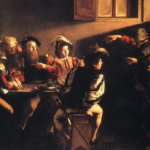(Untitled)
From Lisa Deam in Christianity Today, “One of my pet peeves is receiving an email during the latter part of Lent with the sign-off ‘Happy Easter!’ or ‘Jesus is risen!’ I have to fight the temptation to reply, ‘Not just yet!’ Such proclamations, although well meaning, rush me to a destination I’m not ready to reach. Before I experience the joy of Easter morning, a lengthy journey awaits.”
Not just yet? Christ is risen. Let’s not pretend otherwise.

